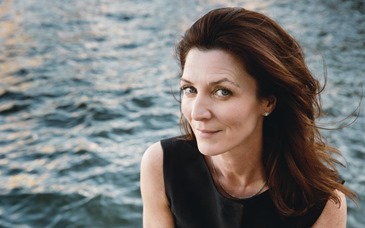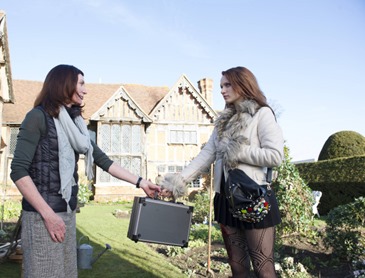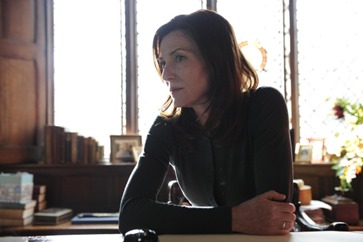Michelle Fairley is likely best known for playing Lady Catelyn Stark on Game of Thrones, but by the end of the summer, will possible be known as well from playing terrorist leader Margot Al-Harazi on 24: Live Another Day (Fox, Mondays, 9/8C).
Late last week, she take some time to talk with a group of bloggers/journalists about playing a terrorist, how she got the role and how 24: LAD is very much like a Shakespearean tragedy. We’ve included a clip from this week’s episode showcasing Fairley with this interview. Check it out following the jump.
Hi, Michelle. Thanks so much for making time for this today. It’s exciting to talk to you.
Michelle Fairley: Pleasure. Pleasure.
Even the – all villains in television and film always think they’re right and they’re motivated by thinking they’re doing the right thing, but how do you find a way to connect with a character who is so violent and so committed to hurting other people?
Michelle: Actually, those sorts of characters [indiscernible] in terms of connecting with a character who is extreme. You’ve just got to trust – just throw yourself in there. Trust, do as much research on passion as possible – passionate causes, people, like freedom fighters, whatever. Whether it be Sheikh [indiscernible] or anybody. [Indiscernible] motivate people like that, it’s a belief. It’s an absolute gut belief that they are in the right.
In some ways, they are easier to play because they don’t question things. They don’t question because they know they’re totally driven. The problem with them is that most people just label as mad, as crazy, but actually, to them, they’re not. They don’t walk around going, oh, I’m crazy. They don’t. They are passionate and they are driven and they’re totally committed. They have a tunnel vision to achieve their goals. They expect to do what they have to do in order to attain that.
Also, the thing with Margo is she is not asking anybody to do anything that she herself has not done in the past. She knows what it takes to do these things. That’s why she is very conscientious and she’s very watchful of the people around her because she’s been in that position herself and she knows the doubts that will creep into somebody’s mind because they probably crept into hers, so she had to fight against those doubts in order to achieve her goal.
Great. As a quick follow up, we’ve seen Margo – Margo’s daughter seems to really be the foot soldier. Will we get to see Margo maybe out in the field or conducting some operations herself, a little action maybe?
Michelle: She does get action. Yes, absolutely she does. It’s further on in the series. Her daughter is definite – you’re absolutely correct in saying that she is the foot soldier. But that is what Simone is doing, what Margo used to do; therefore, Margo is second-guessing any possible commitment problems that her daughter might have because she went through them herself. But, yes, she does get out [indiscernible] by herself.
Thanks so much. I’m looking forward to seeing what other horrible acts you are up to.
Michelle: Blame the writers. They’re brilliant. Thank you.
I was just wondering, how was Margo described to you as far as when you got the script and what input did you have as to the ruthlessness of her because she was pretty ornery with Simone’s waist, stitching it up. I was like, I couldn’t believe that.
Michelle: It’s a pretty good scene. I remember filming it, actually, and there was a very brilliant prosthetic and Emily was on the bed and we had this prosthetic [indiscernible] around her leg. It was actually really hard to get the needle into the prosthetic. It was a lot of effort to get that thing in and pull through. Most of the time, it wasn’t going through.
The camera was on your face, it wasn’t actually on the needle. Then they would shoot on the needle at different times, so most of the time, you were saying lines and going, why isn’t this bloody thing going [indiscernible]. In your head you have two dialogues going on, trying to make it look like you knew what you were doing from the start because, trust me, I am not a sewer at all.
When I was offered the part I had a great conversation – I’ve had many great conversations with the writers in L.A. They were just incredibly passionate about the fact that this is a committed woman. It’s very easy to mark her as a looney. It is, but, actually, you can’t play her as that. She’s an intelligent human. She’s an intelligent woman who totally believes in her cause. She’s mourning her husband, as well. He died in a terror strike as well. She has a lot of pain in her life, too. She totally believes in the cause that her husband was fighting for. She’s committed.
The guys were very diligent about the fact that this woman, she’s running this like a military operation that has taken many years of planning to come to this point. She’s patient. She knows it’s the right time to strike and she will take this with such seriousness. It’s so orchestrated and not only is she watching it herself, but she’s also having to check the people around her at the same time, to check that there are no weak links in this chain because it’s taken so long to get to this point.
I’m anxious to see the rest of this, what you do to President Heller.
Michelle: You know, it’s a thin line between love and hate.
From the last episode [indiscernible] looks like Margo’s son-in-law might be in for a bit of trouble. Can you let us know anything about that?
Michelle: Your gut instinct is probably correct. I think what Margo says very clearly about her son-in-law is he isn’t committed. He is not committed. Her daughter, this marriage is incredibly important to her daughter and it’s a very fine line that Margo has to tread here, but it’s a [indiscernible] family are incredibly [indiscernible] to her. She expects 100% loyalty from her children that she would give them 100% loyalty. As far as she’s concerned, there would actually be no side to take if push came to shove where her son-in-law was concerned.
It almost seems between Margo and Samar, her son in law, that it’s somewhat Shakespearean. Wouldn’t you say?
Michelle: Yes. They’re completely driven by the mission basically. These are massive. She’s expecting total commitment from her family. There is no question about that at all. She’s never ever had to call this into question, ever. They are a very close family. Love comes into play into this heavily – very, very heavily from her daughter’s point-of-view with her husband plus her relationship with her mother.
Then there’s the envious side of the son who seems to be the one that isn’t so much in favor at the moment. There is a real power struggle for affection from – because those children lost their father as well and Margo’s last husband was their stepfather. It’s constantly [indiscernible]. The children are constantly seeking affection.
Right. Yes, it sounds like a Shakespearean tragedy.
Michelle: Yes. Absolutely. It’s a proper Shakespeare tragedy. Very much so.
We know that you play a lot of really wonderful strong female roles. I’m wondering if this is something that you gravitate to or do they happen to land on you because you’re among some of the historical, legendary TV ladies?
Michelle: That’s very kind. Thank you. I think there is a Jekyll and Hyde where the casting is concerned really. I think sometimes – I do a lot of theater, as well, and usually in theater I’ll get the vulnerable, emotional – that sort of strong, emotional – you know, the all – you’re actually right in saying that a lot of the characters have a total commitment, a passion about something and a belief, a strong sense of belief, whether it’s a moral one or a personal one, about love or relationship or doing the right thing towards other people.
It’s something I enjoy playing. I relish it actually. But they are always conflicted. Nothing is emotionally linear with these people. They’re usually – they undulate like crazy but, at the core of all of this, they have a very strong commitment.
As a follow up, the setting for 24 usually kind of seems to be a character in itself at times. Can you talk a little bit about how the gloom and darkness of London has maybe contributed to the drama of this show?
Michelle: Yes. I expect, from my point-of-view, we’ve been shooting in a beautiful house in the country. Then a lot of the interior is Margo’s London life. It seems, on the surface, to be one of incredible wealth, but it always lived in the shadows and London has a history of that as well. It’s got – with Dickens and all these amazing writers, Shakespeare, the whole London theme.
But there is something about the weather in London, as well, which adds atmosphere, too. The river and the buildings and all those pieces come together. It’s a very different environment to L.A. It’s also got hundreds and hundreds of years on its side as well. You look at the buildings and you get majesty and beauty and then it counteracts that [indiscernible] with a lot of the contemporary modern buildings that there are in [indiscernible] as well.
It’s a fantastic – it’s a wonderful thing to show London in this way. [Indiscernible], the filmmakers, and the directors, and the writers, they’d been using lots of different points of London, too. It is very funny when you know London really well and suddenly they’re beside the river and then the next thing they’re at the Wembley Stadium or something, but the river is nowhere near Wembley Stadium. It’s crazy. When you know London you know [indiscernible], but sometimes in filming that doesn’t always matter. They take artistic license.
Now, originally Judy Davis was set to play your character. I was wondering if you could tell me a little bit about the casting process and how you were selected and what were your thoughts on taking on this character who is a terrorist?
Michelle: Basically, what happened, I was offered the part. [Indiscernible] Chris Schmidt, who is my American agent in Paradigm and, also, Peter Brooks, my London agent at CAM, they worked together with the producers at Fox. Then, eventually, they obviously came up with the suggestion. Eventually it was accepted.
The next thing to do is to talk to the writers and find out who this person is, or who they have based her on, and what is her story. Because they write the scripts as they go along on 24, the writers made it very clear to me that they had a strong – they knew exactly what they wanted this woman to be like.
Also, once you start inhabiting a role like that and it goes on film, and they’re watching it, and seeing what your strengths are, or your weaknesses, then they can write accordingly for the person playing the role. Also, it makes it very interesting watching how characters interact. But they already had very strong – they knew exactly how she was going to pan out, but it makes it more exciting for them to write with a particular person in mind as well.
Right. As a follow up, before taking on the role, were you a fan of 24? Did you watch the show and were you familiar with the series?
Michelle: Yes, I absolutely was. I loved it, actually. One of the great things about being cast in it is it meant that I had to [indiscernible] to go back and re-watch some of the seasons, as well, which was fantastic just to get into the rhythm [indiscernible], to get its style, to get its pace. It’s fantastic. Every episode ends on a cliffhanger. It’s just fantastic fun and the actors are wonderful in it and it was a joy to go back and watch it again.
I just wanted to ask you about your career, I guess, has mostly been on the stage and television. You’re probably best known to British audiences. You’re now maybe in the middle part of your career and you get both Game of Thrones and 24, two huge international hits. What has it been like finding that kind of fame at this stage in the game?
Michelle: That’s very kind of you to say those words, but in many ways, you don’t think of it like that. You think of it as being fortunate enough to even be considered for roles like that and to get them and to do a job that you absolutely adore. No matter where you go in the world, if people do approach you, or recognize you, they do it with such grace and adoration and just love for the shows. It’s incredibly humbling, actually. If anything, it makes you want to do even better.
I don’t think – I certainly know, as an actor, you’re constantly riddled with self-doubt and you’re always sort of – you are your own worst critic. It’s very hard to sometimes even accept compliments, but it’s incredibly humbling when people come up to you because there is no reason to, apart from just to say we love the show, or we loved your work, or something. You don’t expect that so it’s always lovely when it happens.
In that case, are you prepared – you’re playing a villain. People may be approaching you and saying, I hate you. I hate your character.
Michelle: Well, you know, you take the good with the bad. In many ways, if they hate her that means I’ve made her work in some ways because she is detestable. But I think what’s interesting about Margo is that she’s in progressive. You start to see more of her own story, of her back story, of what actually drives this woman and her emotional journey as well. Her commitment has come through pain and loss actually. It’s about revenge. It’s about questioning what governments do, as well, and the power that they have over their own people. She’s not just a villain; there is an emotional conflict within herself as well.
I’m looking forward to Jack Bauer catching her. Thank you very much.
Michelle: You’re so welcome. Thank you.
Photos courtesy of Fxo


